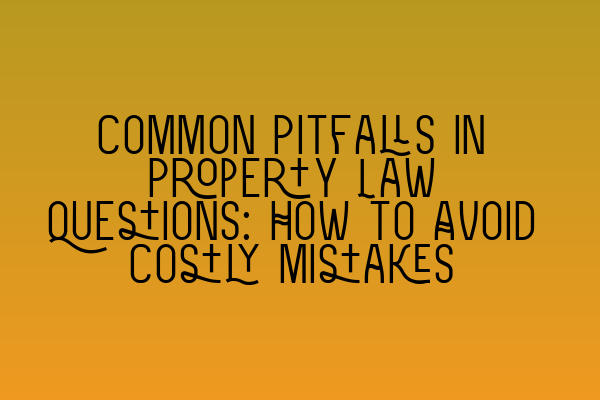Common Pitfalls in Property Law Questions: How to Avoid Costly Mistakes
As a property solicitor, I often come across individuals who have encountered costly mistakes in their property law inquiries. These pitfalls can lead to significant financial and legal consequences, making it crucial to navigate property law questions with caution. In this blog post, I will discuss some common pitfalls in property law questions and provide insights on how to avoid them.
1. Lack of Understanding in Property Law Principles
One of the most common pitfalls is a lack of understanding in property law principles. Property law is a complex field with various legal concepts and rules that govern property ownership, transfer, and dispute resolution. Failing to grasp these foundational principles can lead to misinterpretations and errors in legal analysis.
To avoid this pitfall, it is essential to invest time and effort in studying property law principles. Taking SQE 1 practice exam questions and SQE 1 practice mocks FLK1 FLK2 can provide invaluable opportunities to test your knowledge and identify areas that require further study. Additionally, enrolling in SQE 1 preparation courses can help you develop a solid foundation in property law.
2. Failure to Analyze the Facts Carefully
Another common pitfall is the failure to analyze the facts of a property law question carefully. Property law problems often present nuanced scenarios and require a comprehensive understanding of the facts in order to arrive at the correct legal conclusion. Rushing through the facts or misinterpreting them can lead to incorrect outcomes.
To avoid this pitfall, take your time to carefully read and analyze the facts provided in the question. Ensure that you understand all the relevant details and consider any potential implications they may have on the legal analysis. Practice mock exams and quizzes can be helpful in improving your analytical skills and ensuring accuracy in your assessments.
3. Inadequate Knowledge of Case Law and Statutory Provisions
A lack of knowledge in case law and statutory provisions is another pitfall that can compromise the accuracy of your legal analysis. Property law relies heavily on precedent and legislation, and failure to consider them can result in incorrect conclusions and potentially costly mistakes.
To avoid this pitfall, make sure to stay updated with recent case law and statutory provisions in property law. Keeping yourself informed about recent developments and landmark decisions can enhance your legal analysis and provide you with a solid foundation to draw upon in your answers. SQE 2 preparation courses can offer comprehensive coverage of relevant case law and legislation to help you stay up-to-date.
4. Insufficient Attention to Detail
Property law questions often involve intricate details that may seem insignificant but are crucial in determining the correct legal outcome. Failing to pay attention to these details can lead to errors and misunderstandings.
To avoid this pitfall, develop a keen eye for detail and ensure that you thoroughly examine each aspect of the question. Highlight any relevant information and consider its potential significance in your legal analysis. Practicing with SQE 1 preparation courses that emphasize attention to detail can help you hone this skill and improve your overall performance.
5. Lack of Familiarity with Examination Format and Time Management
Lastly, a common pitfall is a lack of familiarity with the examination format and inadequate time management skills. Property law questions in the SQE exams are timed, and failing to manage your time effectively can lead to incomplete or rushed answers.
To avoid this pitfall, familiarize yourself with the examination format and practice time management strategies. Taking regular practice exams and mock tests under timed conditions can help you gauge your speed and identify areas where you need to improve. Understanding the structure of the exams and managing your time wisely can significantly enhance your performance on property law questions.
In conclusion, property law questions can be challenging, but with careful preparation and attention to detail, you can avoid the common pitfalls that can lead to costly mistakes. By investing time in understanding property law principles, analyzing facts diligently, staying updated on case law and legislation, paying attention to detail, and practicing effective time management, you can navigate property law questions confidently and achieve desired outcomes.
For additional resources and support in your SQE preparation journey, I recommend checking out the following articles:
– SQE 1 Practice Exam Questions
– SQE 1 Practice Mocks FLK1 FLK2
– SQE 2 Preparation Courses
– SQE 1 Preparation Courses
– SRA SQE Exam Dates
Remember, understanding and avoiding these common pitfalls can significantly enhance your performance in property law questions and help you succeed in your legal career. If you require further assistance or have specific inquiries, don’t hesitate to consult with a qualified property law solicitor.
